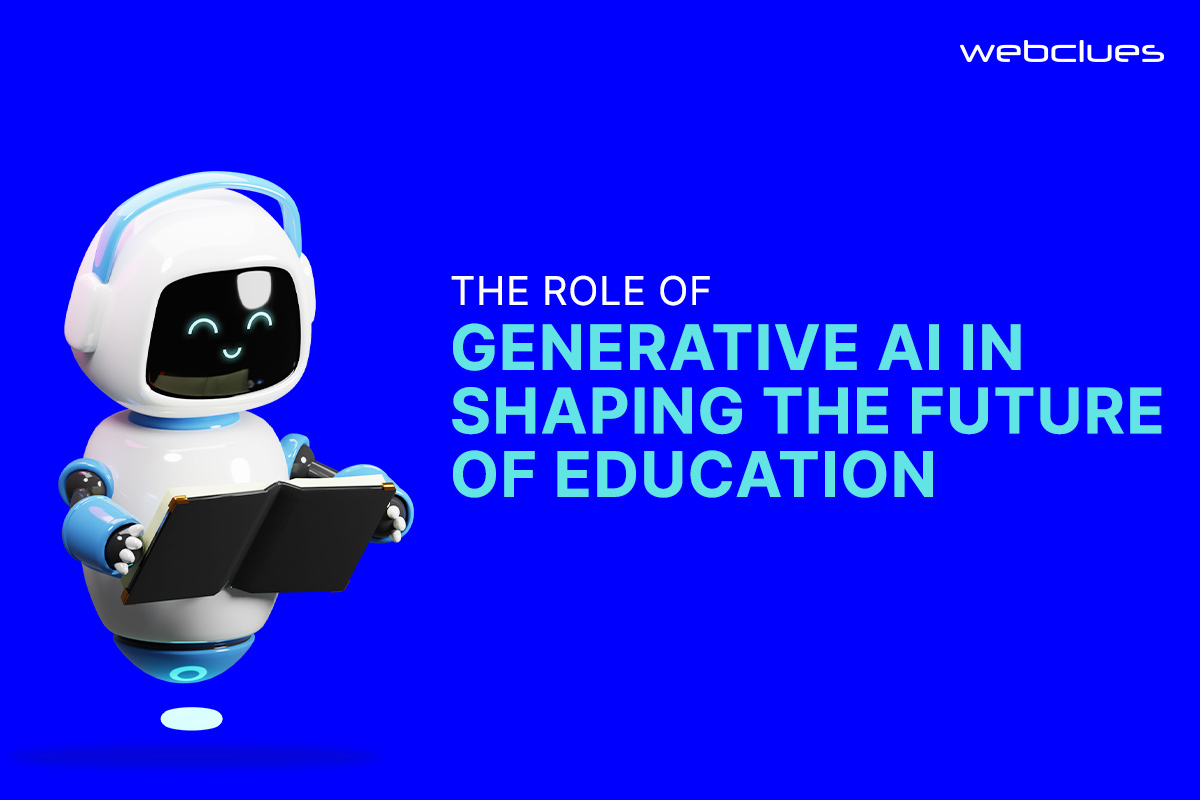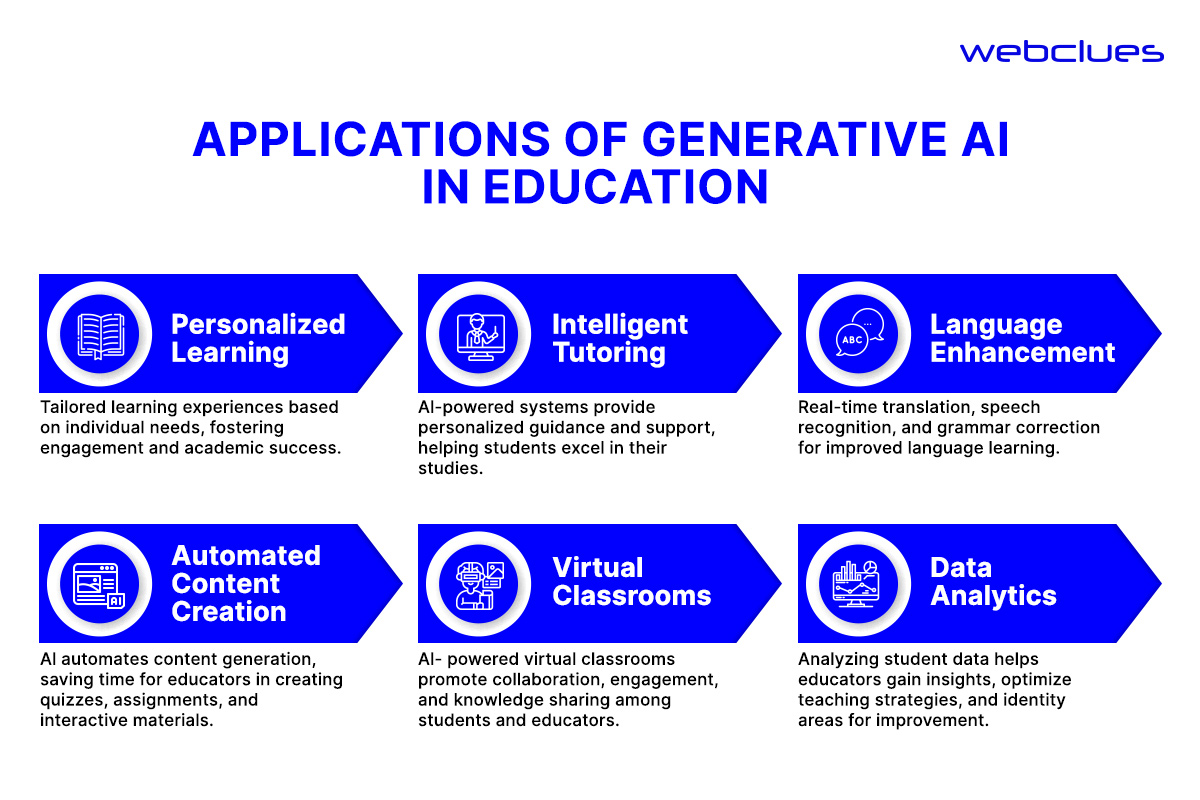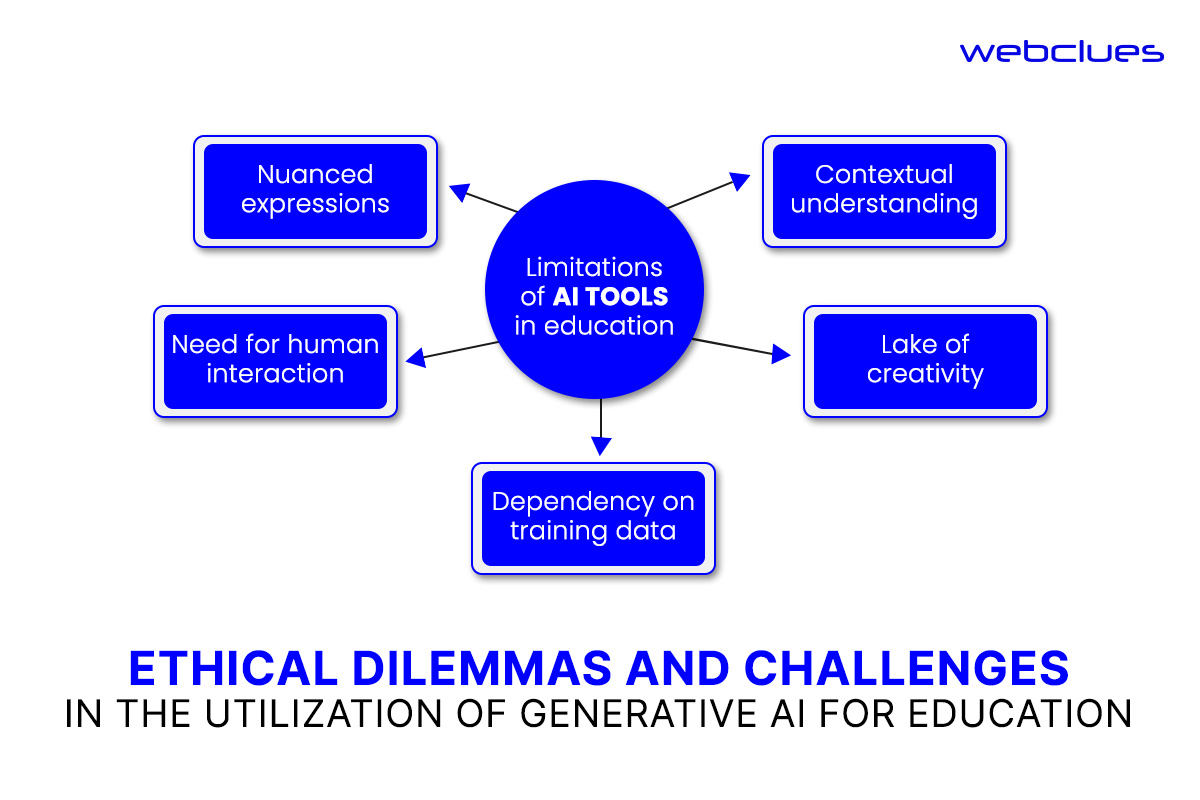The Role of Generative AI in Shaping the Future of Education

Generative AI is a powerful and innovative technology that can create and customize content, enhance learning outcomes, and assist educators and learners in various ways. In this blog, we explore the applications and implications of Generative AI in the education industry, which is undergoing a profound transformation due to the revolutionary potential of Generative AI.

From personalizing learning experiences to automating content creation and offering AI-driven assessment tools, generative AI is paving the way for a more dynamic and accessible education. We’ll also discuss the real-world use cases, benefits, and challenges of implementing Generative AI in different educational contexts, such as online courses, classrooms, and tutoring.
To understand the far-reaching impact of generative AI in further detail and explore how this technology benefits students, educators, and institutions, take in the article from start to finish.
Applications of Generative AI in Education
Generative AI has found a multitude of applications in the education sector, serving as the building blocks of a transformative learning experience. The following are the key applications of generative AI that are transforming education across the domains.

Personalized Learning
Education has long grappled with the challenge of a one-size-fits-all approach. Students have different backgrounds, levels of knowledge, and learning speeds. However, generative AI can help meet their individual needs by creating personalized learning experiences.
Generative AI uses large amounts of data on how students learn and perform to customize learning experiences for each student. It identifies individual strengths and weaknesses, adjusting the assignments and tests to suit each student’s abilities and needs. It also gives extra support to help students improve in areas where they have difficulties. This personalized approach allows students to learn at their own pace as well as stay motivated.
For instance, consider two students who are good at different areas of math. One excels in geometry but finds algebra challenging, while the other is ahead in algebra. Generative AI personalizes their experiences accordingly. The first student receives practice problems that focus on algebraic concepts, while the second encounters more advanced algebra problems or is introduced to basic trigonometry.
Generative AI also changes how students interact with the learning content. Students can have more control over their learning process and get content that matches their needs and preferences.
Furthermore, generative AI in teaching and learning is especially helpful for students who have learning disabilities or disorders like dyslexia or ADHD. For example, Speechify is a generative AI tool that can turn text into speech or speech into text. This technology can help students who have trouble with reading or writing. For students who have problems with focusing, like ADHD, tools like Speechify can read the text aloud for them, making learning easier and more interesting.
Automated Content Creation
Creating educational content that is both informative and engaging is a big challenge for educators. Generative AI can help by making content creation faster, easier, and more adaptable. It can use large datasets of existing educational materials to generate new content, such as lesson plans, worksheets, or textbooks. The generated content can be customized to meet the specific needs and preferences of educators and students.
For example, a history teacher can use Generative AI to create a lesson plan on ancient civilizations. Generative AI can quickly produce a detailed outline with key points, interactive activities, and multimedia resources. This saves time for the teacher and makes the lesson more interesting for the students.
Generative AI can also create textbooks that are up-to-date, engaging, and customizable. These textbooks can fit the curriculum and students’ needs. This is important because education is always changing and evolving.
Generative AI is changing the way content creation works in education. It makes it more efficient, dynamic, and responsive to the needs of educators and students. It offers new possibilities for the future of educational materials, making them more engaging and informative.
AI-Driven Assessment Tools
Grading and assessing student work is a task that takes a lot of time for educators. Generative AI can help by creating AI-driven assessment tools that make this task easier and faster. This technology can use data and pre-trained models to grade student work, such as assignments, tests, essays, and problem-solving tasks. It can also give feedback to students on how they can improve their work.
For example, imagine a class with hundreds of essays to grade. Generative AI can quickly grade and score these essays, giving students feedback sooner. The AI system can show students what they did well and what they need to work on, helping them learn better.
AI-driven assessment tools also let educators spend more time on other parts of teaching. They can use the time they save on grading to interact more with students, help them with their individual needs, and offer more support where needed.
These tools are very useful in online learning, where automation makes sure that students get feedback faster, making the learning more fun and engaging. As AI improves, it can change the way we grade and give feedback on student work, making education more effective and accessible.
Language Learning Support
Language learning often requires extensive practice, precise pronunciation, and real-time feedback, and this is where Generative AI can be an ally. It can make it easier and more interactive, as generative AI applications can simulate real-life language interactions. Students can engage in conversations, practice pronunciation, and even learn cultural nuances, all in a safe and interactive digital environment. These applications provide a dynamic learning experience that mirrors conversing with a native speaker.
For instance, if you're learning French, Generative AI can offer a platform for conversational practice. It generates dialogues and scenarios for you to talk and understand. It also gives you feedback on your pronunciation and comprehension. This way, you can improve your fluency and confidence.
Generative AI-driven language support is not limited to spoken language. It can even help you with writing in a new language. It can generate text, give you grammar and style tips, and even translate content accurately. These tools help you learn all aspects of the language, preparing you for a globalized world.
Virtual Labs and Simulations
Virtual labs and simulations are a new way of learning science and engineering with Generative AI. This technology lets students perform experiments and explore scientific ideas in a digital world. They can learn by executing projects, without needing a physical lab or equipment.
Whether it's chemistry experiments, physics simulations, or engineering prototypes, this technology recreates the hands-on experience. This lets them understand complex scientific concepts better.
This way, by facilitating engaging and interactive virtual labs and simulations, generative AI makes learning science and engineering more fun and exciting.
Safeguarding Data Privacy
Generative AI in education can help protect student privacy by creating synthetic data for training data sets. Synthetic data is not real data but mirrors it. It is generated by AI models that have been learned from real data. Synthetic data can be used to train different algorithms without exposing the real data that has personal information about students.
Synthetic data is a way to keep students’ data safe and anonymous. It can prevent data breaches or hacking incidents that can reveal sensitive information about students. It also has another benefit: it can improve the performance of analytical models.
Essentially, by creating effective and valuable synthetic data for training data sets, generative comes as a great solution for data privacy, as it can generate data that is safe and useful.
Ethical Dilemmas and Challenges in the Utilization of Generative AI for Education

While generative AI can change the way education works, it also comes with ethical issues and challenges that need to be considered. This technology has a lot of potential, but it also has some risks that need to be managed to make sure it is used responsibly and fairly.
Some of the ethical issues and challenges are:
Privacy Concerns:
Generative AI often uses student data to create personalized learning experiences. This data is sensitive and needs to be protected from unauthorized access and misuse.
Solution:
- Data Encryption and Access Control: Use robust encryption and access controls to protect student data.
- Transparency and Consent: Clearly communicate data usage policies and obtain informed consent from students.
Bias and Fairness:
AI models can have biases from the data they are trained on. In education, this could create inequalities and affect students differently based on things like race, gender, or socioeconomic status.
Solution:
- Diverse Data and Bias Auditing: Train AI models on diverse datasets and regularly audit them for biases.
- Ethical Guidelines: Develop guidelines for content generation to prevent discriminatory outcomes.
Quality Control:
Generative AI can create content, but it is hard to check the accuracy and reliability of the content. It is important to ensure the quality of educational resources.
Solution:
- Human Oversight and Feedback Loop: Combine AI with human review and establish feedback mechanisms to maintain content quality.
- Periodic Review: Regularly review content for accuracy and relevance.
Depersonalization:
Using AI for personalized learning could make the educational experience less human and emotional. The role of human interaction and emotion in learning is important.
Solution:
- Balancing Human and AI Interaction: Ensure AI personalization complements human engagement.
- Mental Health and Well-being Check-ins: Establish AI-driven systems that periodically check in on students' mental health and well-being, providing early intervention when necessary.
Educator Preparedness:
Educators need to be trained and supported to use Generative AI in their teaching. They need to be comfortable with the technology and know how to use it effectively.
- Training Programs and Support Networks: Offer training programs and support networks for educators.
- Continuous Learning: Promote ongoing learning and adaptation as technology evolves.
How Generative AI Can Enhance Education in the Future
Generative AI holds immense promise for shaping the future of education, with a multitude of advancements and implications that pave the way for transformative learning experiences. Let’s look at the future directions and far-reaching impacts of Generative AI within the education industry.
Potential advances
Generative AI in education is expected to become more accurate and realistic as technology progresses. It will be able to use natural language processing to generate and understand content in different languages and domains. It will also leverage deep learning and neural networks to create self-aware and adaptive learning systems that can be tailored to students’ needs and preferences.
Implications for teaching and student success
Generative AI can transform teaching by providing teachers with powerful tools and resources. Teachers can use generative AI to create customized and interactive curricula, simulations, and assessments. They can also use generative AI to provide personalized and timely feedback and guidance to students. These features can increase student engagement, motivation, and achievement. Moreover, generative AI can help teachers collect and analyze data on students’ progress and performance, enabling them to make informed decisions and interventions.
Integration with other emerging technologies
Generative AI can be combined with other emerging technologies, such as augmented reality (AR) and virtual reality (VR), to create immersive and experiential learning environments. By integrating generative AI with AR/VR, teachers can create realistic simulations, virtual labs, and virtual tutors. These technologies can enhance students’ understanding, provide hands-on exploration, and offer opportunities for experiential learning. Furthermore, generative AI can create virtual assistants that provide real-time feedback and support in a learning environment by following interactive instructions.
Wrapping It Up
Generative AI is not just a tool but a catalyst for change. It holds the promise to bridge educational gaps, make education more accessible and engaging, and provide lifelong learning opportunities for all. However, the responsible and equitable deployment of this technology is essential to unlock its full potential. With the right ethical framework and a commitment to fostering an environment of continuous learning and adaptation, generative AI solutions can lead to a new era of education that transcends boundaries and aids learners of all ages and backgrounds. To sum it up, the potential is immense, and the possibilities are as infinite as the human thirst for knowledge.
So whether you're an educational institution looking to embrace this revolution or an ed-tech entrepreneur seeking to integrate generative AI into your solutions, the future is bright. At Webclues Infotech, we're at the forefront of Generative AI development services, and we're here to help you with personalized solutions that match your educational goals, ensuring that you leverage the full potential of this cutting-edge technology.
Take the next step towards reshaping education. Contact us today, and together, we shall reinvent learning, support educators, and enrich the lives of students.
Build Your Agile Team
Hire Skilled Developer From Us
Leverage the potential of Generative AI for your education venture.
We at Webclues offer cutting-edge generative AI solutions for businesses in the education sector. Our team of experts ensure that our solutions exceed you expectations.
Get a QuoteOur Recent Blogs
Sharing knowledge helps us grow, stay motivated and stay on-track with frontier technological and design concepts. Developers and business innovators, customers and employees - our events are all about you.
Contact Information
Let’s Transform Your Idea into Reality - Get in Touch
India
Ahmedabad
1007-1010, Signature-1,
S.G.Highway, Makarba,
Ahmedabad, Gujarat - 380051
Rajkot
1308 - The Spire, 150 Feet Ring Rd,
Manharpura 1, Madhapar, Rajkot, Gujarat - 360007
UAE
Dubai
Dubai Silicon Oasis, DDP,
Building A1, Dubai, UAE
USA
Delaware
8 The Green, Dover DE, 19901, USA
New Jersey
513 Baldwin Ave, Jersey City,
NJ 07306, USA
California
4701 Patrick Henry Dr. Building
26 Santa Clara, California 95054
Australia
Queensland
120 Highgate Street, Coopers Plains, Brisbane, Queensland 4108
UK
London
85 Great Portland Street, First
Floor, London, W1W 7LT
Canada
Burlington
5096 South Service Rd,
ON Burlington, L7l 4X4





